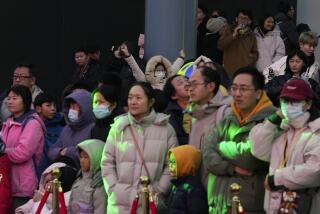China Tightening Rural Population Control Program
- Share via
PEKING — Over the past week, the Chinese government has launched a new campaign to strengthen enforcement of population control policies in rural areas where nearly 800 million people live.
In a series of newspaper articles and circulars to local Communist Party cadres, the authorities have expressed fear that the family-planning rules are being eased or ignored in the countryside because there is now more food.
The campaign appears to be aimed at ensuring that local officials carry out the policies and the family-planning quotas established in Peking and the provincial capitals.
On Friday, Peking’s municipal Communist Party committee sent an open letter to all party members in the area around the capital. It urged them to marry late, to delay the decision to become parents, and to conform to the limit of one child per family. The party cadres were told to try to ensure that others around them do likewise.
Tied to Living Standards
“The peasants’ life has been greatly improved,” the committee said. “However, if there is no efficient birth control, further increases in the standard of living will be restrained by population increases.”
A similar letter was sent out earlier in the week by party officials in the city of Qingdao on the coast. Meanwhile, according to radio reports, authorities in Shanxi province in north-central China recently called an urgent meeting to discuss “the partial loss of population control” in that mountainous area.
On Thursday, the sixth anniversary of the formal adoption of the one-child-per-family policy, the official Health News warned in an editorial that the one-child limit is a “long-range strategic principle policy. . . . It is a wrong idea that there is no need to stress the policy since China’s economy has developed.”
Underlying the new campaign is the concern of Chinese officials that in the countryside, where resistance to family planning has been the strongest, local officials have been quietly abandoning the effort to enforce national policies on population control.
Preference for Boys
A Western expert who lived for two months this year in a tiny village in rural Shaanxi province said that he saw many families with three to five children, and that the traditional preference for boys remains extremely strong.
“If they had baby girls, they just failed to register them with the government,” this official said. (Unregistered children are not entitled to an education, food rations or other government benefits.)
The official newspaper China Legal News acknowledged earlier this month that female infanticide continues to be a serious problem. It cited figures from the Women’s Assn. of Western Chongqing showing that in that city alone there were 2,800 cases in 1984 involving either the drowning of baby girls or the mistreatment of women who gave birth to girls.
When China’s one-child-per-family policy was adopted in 1980, it applied equally to urban areas and to the countryside, where 77.6% of China’s people live.
But over the last two years, in an effort to make population control more palatable to the peasants, the authorities began emphasizing that, in certain circumstances, peasant couples could get approval to have a second child.
Limited to Cities
“We are only advocating the one-child family in the cities,” Shen Guoxiang, deputy director of China’s State Family Planning Commission, told The Times in an interview last year. “In the rural areas, where people have been found to have difficulties, they can have a second child.”
Shen emphasized that China was not retreating from its goal of holding the population, now just over 1 billion, to no more than 1.2 billion by the year 2000. And he said Peking will continue to fix quotas for the numbers of births allowed in each of China’s provinces and regions.
Authorities now seem to be concerned that this limited relaxation of the policy in rural areas over the last two years may have been taken by officials in the countryside as a green light to ease up in general on population control.
The circular sent out Friday by the Peking party committee repeated the pledge that, in special cases, families could get approval for a second child. However, it went on, “measures should be taken to stop the phenomenon of having a second child outside the plan,” without official approval.
More to Read
Sign up for Essential California
The most important California stories and recommendations in your inbox every morning.
You may occasionally receive promotional content from the Los Angeles Times.













